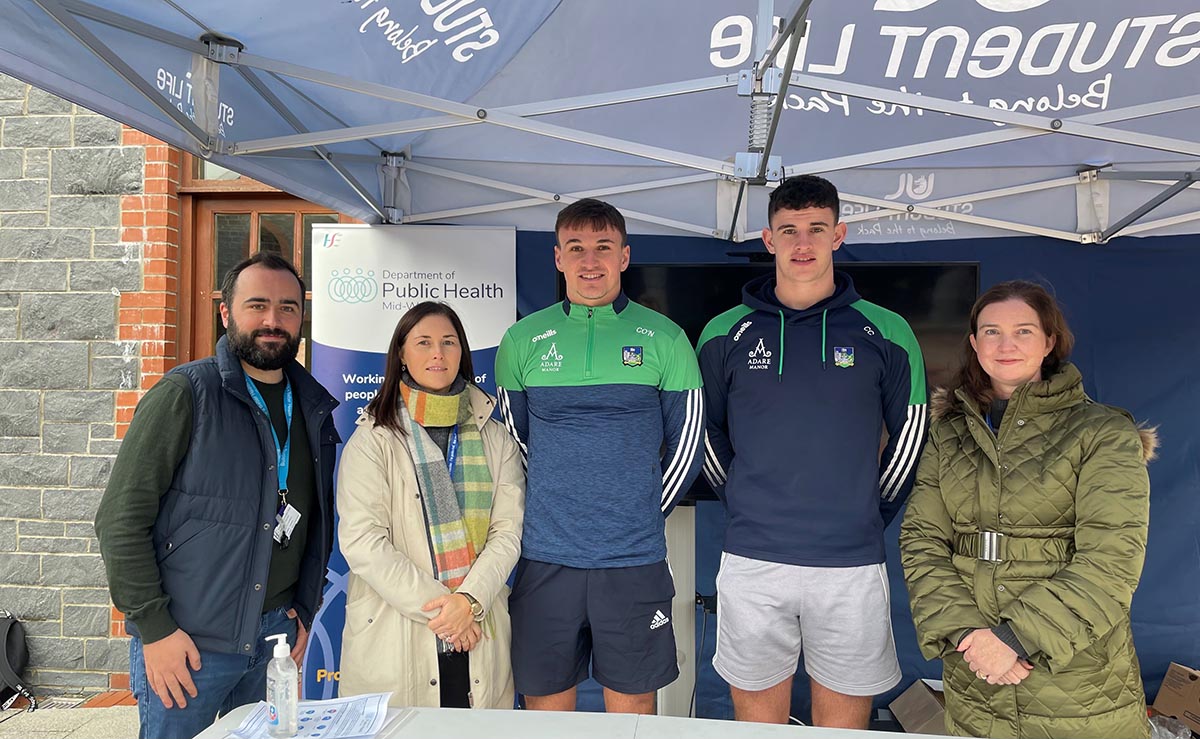The Department of Public Health Mid-West, ACT for Meningitis, UL Student Life, and Limerick GAA have joined forces to highlight the importance of young people knowing the signs and symptoms of meningitis.
The joint initiative involves a multi-disciplinary, multi-media awareness campaign, promoting this key message, in addition to educating the young and local population about meningitis.
Meningitis is a serious and life-threatening illness, caused by infection and inflammation of the protective layers of the brain and spinal cord. While there are many causes of meningitis, the two most commonly seen are viral and bacterial meningitis.
Viral meningitis is more common but rarely fatal. Bacterial meningitis is less common, but may be accompanied by septicaemia (blood poisoning), which can result in death. It is most common from September to April but can occur any time. Ireland has among the highest rates of meningitis in Europe.
While babies and young children are most at-risk, we do see a peak in teenagers and young adults.
It can be caused by a variety of different germs, mainly bacteria and viruses. The spread of the bacteria is caused by droplets from the nose and mouth.
Bacterial meningitis or septicaemia requires urgent antibiotic treatment.
While the risk to the wider community is considered low, we do want the general public to be aware of the signs and symptoms of this disease.
Some of the symptoms one might experience are:
- Severe Headaches
- Fever
- Vomiting
- Drowsiness
- Discomfort from bright light
- Neck stiffness
- Having cold hands or feet, or shivering
- Rash – do not wait for a rash
Dr Kenneth Beatty, Specialist in Public Health Medicine at Public Health Mid-West, said: “If you know the signs, don’t waste time. That is our key message with this initiative, as time is of the essence when you start to notice one or some of the symptoms. Knowing the signs could save your life, or your friend’s life, and prevent a devastating loss and impact in a community. We would like to thank all our stakeholders in this initiative that we hope to sustain for many years to come.”
Siobhan Carroll, CEO of ACT for Meningitis, a leading charity on meningitis awareness, said: “ACT for Meningitis, the national support and awareness charity, are urging people to be meningitis aware. While many people associate the disease with babies and children, teenagers and young people are the second most at-risk group. As the early symptoms of meningitis can disguise themselves as other things, such as flu or maybe a hangover, it’s easy to mistake meningitis for something else.
“Early symptoms can include headache, fever, vomiting, muscle pain. Someone with meningitis or septicaemia can get a lot worse very quickly so keep checking them. Further specific symptoms of meningitis include fever with cold hands and feet, stiff neck, dislike to bright lights, drowsiness, confusion and a rash which doesn’t fade under pressure. The symptoms may appear in any order or some may not appear at all. So, please, trust your instincts. Seek medical help if you suspect meningitis, mind your friends,” Ms Carroll said.

Maeve Gilmore, Student Welfare Officer at UL Student Life, said: “It was important for us to support this initiative, so students are aware of the signs and symptoms of meningitis and understand that it’s not just a childhood illness. The deadly thing about this illness is that the signs can often be mistaken for something harmless such as a bad hangover. Creating awareness around the seriousness of meningitis will help empower students with the information they need to act fast should they have any concerns about themselves, their housemates, or friends. We are delighted to see this partnership come to fruition and be able to facilitate a space on campus for students to engage with healthcare professionals, doctors, and experts in the field to help students spot the signs of meningitis and know when to take action.”
John Cregan, Limerick GAA chairperson, said: “We are delighted to partner with Public Health Mid-West on this very important issue. It is so crucial that we listen to our bodies when we feel unwell, that we seek help immediately, and talk to a doctor about our symptoms. Telling a friend or family member is also important, so we can look out for ourselves and each other. Knowing the signs and symptoms of meningitis could save a life.”
